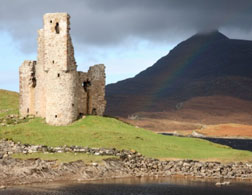English and Scottish Folk Ballads: A vitéz meg a pásztor lánya (The Knight And Shepherd's Daughter Magyar nyelven)
|
The Knight And Shepherd's Daughter (Angol)There was a shepherd's daughter 'Good morrow to you, beautious maid,' 'The Lord forbid,' the maid reply'd, He took her by the middle so small, 'Now you have had your wil, good sir, 'Some men do call me Jack, sweet heart, He set his foot in the stirrop, But when she came to the broad water, He never was the courteous knight But when she came to the king's fair court, 'O Christ you save, my gracious leige, 'What hath he robbed thee of, fair maid? 'He hath not robbed me, my liege, 'Now if he be a batchelor, He called down his merry men all, He brought her down full forty pound, 'O I'le have none of your gold,' she said, Sweet William ran and fetcht her then
'Would I had drank the fair water 'Would I had drunk the puddle-water 'A shepheard's daughter as I was, He set her on a milk-white steed, But when they came unto the place 'Now you have married me, sir knight, 'Accursed be the gold,' he said, Their hearts being then so linked fast,
|
A vitéz meg a pásztor lánya (Magyar) „Adj’Isten, hé, te helyre leány”, „Isten ments”, felelé legott, Átkarolá karcsú derekát „Nos, megkapá, mit kért, uram, „Van ki engem Jacknek nevez, Kengyelbe tevé lábait Valahányszor folyóhoz ért, Nem mondá a finom lovas: A király udvarához ért, „Isten óvja, fenséges uram, „El mit rabolt, te szép leány? „Amit rabolt, fenséges úr, „Hogyha nőtlen az a lovag, Hívta vitéz embereit, Negyven fontot kínált neki „Nem kell nekem az aranyad, Futott William és elhozá „Nem az aranyad kell nekem,” „Innám-e csemely, kút vizét én, „Innám-e pocsolya vizét én, „Pásztor lánya voltam csupán, Hóka paripára tette a lányt, És mikor elmentek oda, „Nos, elvettél, lovag uram, „Átkozott, férj mond, az az arany. Hát így forrt egybe a szivük,
|




